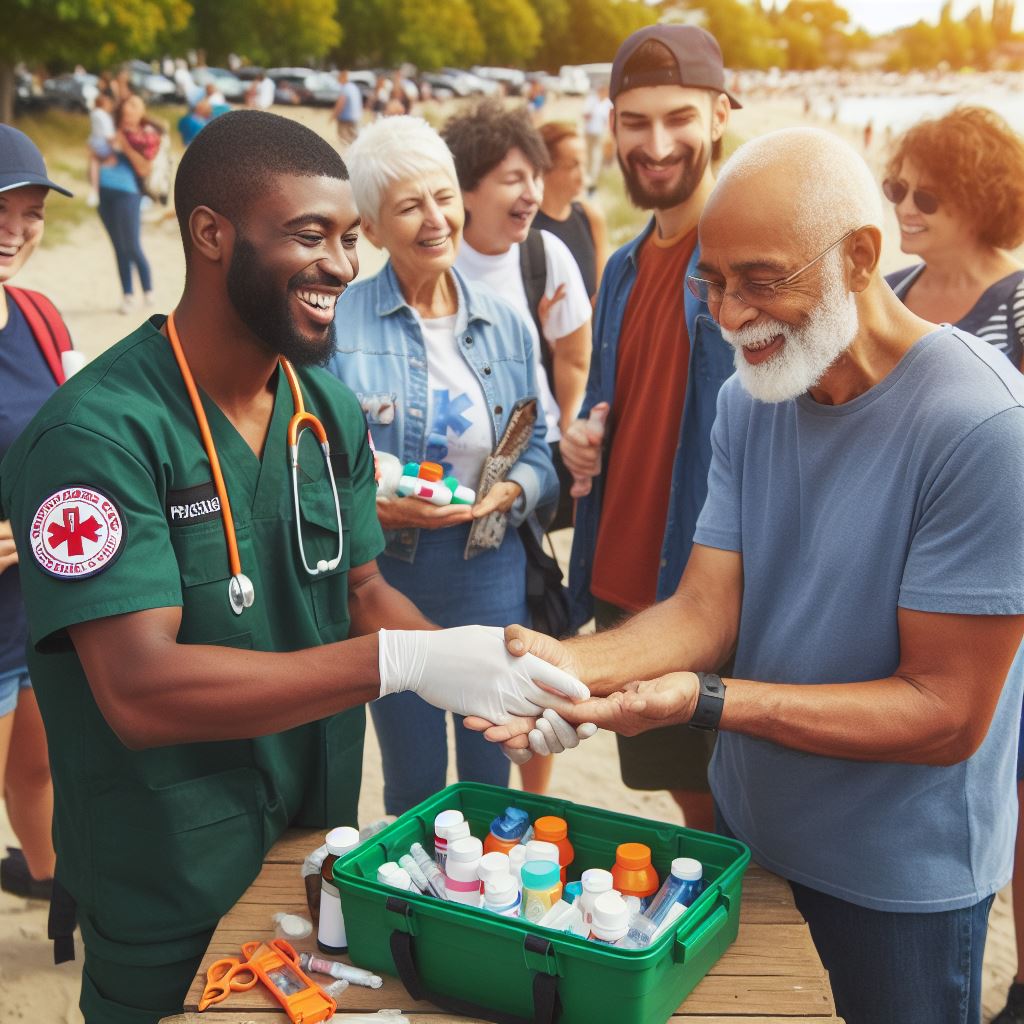Introduction
Paramedics are medical professionals trained to provide emergency care in critical situations.
Community outreach programs play a crucial role in improving health education and access to medical services.
This blog post will discuss the important role of paramedics in community outreach programs.
The Role of Paramedics in Community Outreach Programs
Paramedics are not only first responders but also valuable resources in community health initiatives. (19 words)
1. Providing Basic Life Support (BLS)
Paramedics play a vital role in delivering BLS techniques during community health fairs and trainings. (20 words)
2. Promoting Public Health Education
Paramedics are instrumental in raising awareness about important health issues through educational campaigns.
3. Conducting Medical Screenings
Paramedics are often involved in organizing and conducting medical screenings to identify and prevent health problems.
4. Empowering and Engaging Communities
Paramedics act as facilitators, engaging with communities to promote health and wellness through interactive workshops. (20 words)
5. Collaborating with Local Organizations
Paramedics work hand in hand with local organizations to coordinate outreach efforts and provide healthcare services.
6. Strengthening Emergency Preparedness
Paramedics help communities prepare for emergencies by providing CPR and first aid training programs.
7. Addressing Health Disparities
Paramedics working on outreach programs aim to bridge the gap in healthcare access for underserved communities.
Paramedics are indispensable in community outreach programs, contributing to better healthcare access, education, and overall well-being.
Read: A Day in the Life of a Public Health Officer
The role of paramedics in community outreach programs
Educating the community on emergency response
- Paramedics organize workshops and training sessions to educate the community.
- They teach basic lifesaving techniques such as CPR and first aid.
- Paramedics provide information on the emergency services available in their area.
Promoting public health and safety
- Paramedics collaborate with local organizations and schools to promote public health.
- They conduct health screenings and administer vaccinations to ensure community well-being.
- Paramedics raise awareness about common emergencies and prevention measures.
Engaging with vulnerable populations
- Paramedics reach out to the elderly, homeless, and mentally ill to provide medical assistance.
- They offer necessary resources and support to these vulnerable populations.
- Paramedics establish trust and rapport within the community to better address their needs.
Paramedics are vital in community outreach, actively educating on emergency response. Workshops and training sessions teach life-saving techniques like CPR.
Paramedics ensure communities know where to seek help during emergencies.
Collaborating with local organizations, they conduct health screenings and vaccinations, promoting overall community well-being.
Paramedics raise awareness about emergencies and preventive measures, extending their role beyond immediate response.
Crucially, paramedics reach out to vulnerable populations, offering medical assistance and resources.
Engaging with the elderly, homeless, and mentally ill, they address unique healthcare challenges. By building trust, paramedics ensure these groups receive the necessary support.
Active participation in outreach programs allows paramedics to make a profound impact. Beyond emergency response, they contribute to education, prevention, and support for vulnerable populations.
Collaborating with various entities, paramedics play a key role in creating a safe and informed community.
In short, paramedics, through community outreach, are essential in shaping a healthier and safer society.
Their multifaceted role extends beyond emergencies, encompassing education, prevention, and support for all community members.
Read: How to Become a Paramedic in Canada

Uncover the Details: Emerging Tech in Healthcare Administration
Unlock Your Career Potential
Visualize a clear path to success with our tailored Career Consulting service. Personalized insights in just 1-3 days.
Get StartedExamples of successful paramedic-led community outreach programs
Paramedics play a crucial role in not only providing emergency medical care but also actively engaging with the community through various outreach programs.
By proactively reaching out to underserved areas, schools, and other community organizations, paramedics promote wellness, educate individuals on preventive measures, and enhance emergency preparedness.
Mobile clinics and health fairs
Mobile clinics and health fairs are prime examples of paramedic-led community outreach programs.
These initiatives bring medical services and consultations directly to underserved areas, ensuring that individuals who may not have easy access to healthcare can receive essential medical attention.
By collaborating with local clinics and community centers, paramedics extend the reach of their services and provide comprehensive healthcare options for the community.
In addition to medical services, mobile clinics and health fairs also focus on offering preventive measures and health education.
Paramedics educate individuals about basic healthcare practices, such as proper nutrition, hygiene, and the importance of vaccinations.
By raising awareness and providing access to preventive services, paramedics empower the community to take control of their own health and well-being.
School-based programs
Paramedics actively engage with schools to implement programs that educate students on emergency preparedness.
By teaching students about recognizing emergency situations, contacting emergency services, and providing immediate first aid, paramedics empower young individuals to become confident first responders in their own communities.
CPR and first aid training sessions conducted by paramedics equip students with life-saving skills, preparing them to handle emergency situations effectively.
Paramedics also work closely with schools to implement safety protocols and drills.
By conducting regular safety drills, paramedics ensure that the school staff and students are well-prepared for emergencies such as fires, natural disasters, or medical crises.
These drills help create a culture of preparedness within schools, increasing the overall safety of the students and staff.
Community partnerships and initiatives
Paramedics join forces with other emergency response teams to strengthen community partnerships.
By collaborating with fire departments, police departments, and other emergency services, paramedics create a network of support that can efficiently respond to emergencies within the community.
This collaboration ensures a coordinated and timely response that maximizes the chances of a positive outcome during emergencies.
Paramedics also actively participate in disaster preparedness programs.
By sharing their expertise and knowledge, paramedics contribute to community-wide efforts aimed at responding to and recovering from natural disasters and other emergencies.
Through these initiatives, paramedics help develop robust disaster response plans and enhance community resilience.
Furthermore, paramedics are at the forefront of establishing community paramedicine programs.
These programs aim to enhance healthcare access and reduce strain on emergency departments by providing non-emergency medical services directly to the community.
Paramedics, equipped with extensive medical training, can assess, treat, and offer preventive care outside the traditional hospital setting, improving overall community health and reducing the burden on healthcare systems.
Generally, paramedics are actively involved in community outreach programs that go beyond their emergency response role.
Whether it is through mobile clinics, school-based programs, or community partnerships, paramedics contribute to the well-being of the community by providing medical services, education, and support.
These programs strengthen the bond between paramedics and the community they serve, fostering a healthier and safer environment for all.
Read: Paramedics’ Role in Public Health Emergencies
Benefits and challenges of paramedic involvement in community outreach programs
Benefits
Paramedics play a crucial role in community outreach programs, providing numerous benefits to both the communities they serve and the healthcare system as a whole.
1. Increased community awareness and preparedness
Paramedics engaging in community outreach programs help educate the public about various health issues, such as CPR training, first aid, and recognizing signs of emergencies.
By actively spreading awareness, they empower individuals to respond effectively during critical situations and potentially save lives.
2. Timely access to medical assistance in non-emergency situations
Community outreach programs involving paramedics can offer an alternative to emergency rooms for non-emergency medical issues.
By offering their expertise in community settings, paramedics can assess and provide necessary medical care promptly, reducing unnecessary emergency room visits.
3. Enhanced trust and cooperation between paramedics and the community
Through active participation in community outreach programs, paramedics can build strong relationships with community members.
This fosters trust and understanding, leading to improved cooperation and communication during emergencies.
Paramedics become familiar faces in the community, helping to bridge the gap between healthcare providers and the people they serve.
Challenges
Despite the numerous benefits, paramedic involvement in community outreach programs also presents challenges that need to be addressed for effective implementation.
1. Limited resources and funding
Paramedic involvement in community outreach programs requires additional resources, including personnel, equipment, and training materials.
Limited funding can hinder the expansion and sustainability of these programs, making it necessary to secure adequate financial support to ensure their success.
2. Balancing community engagement with emergency response duties
Paramedics have demanding emergency response duties, making it challenging to allocate time for community outreach programs.
Finding a balance between providing timely emergency services and actively engaging with the community is crucial.
Proper scheduling and staffing adjustments may be necessary to ensure optimal participation in outreach activities without compromising emergency response capabilities.
3. Overcoming language and cultural barriers
In diverse communities, language and cultural differences can pose barriers to effective communication and understanding.
Paramedics involved in community outreach programs must be equipped with cultural competency and language skills to bridge these gaps.
Collaboration with community leaders and organizations can also facilitate cultural exchange and understanding.
In general, the benefits of paramedic involvement in community outreach programs are evident in the increased awareness and preparedness of the community, timely access to non-emergency medical assistance, and improved trust and cooperation.
However, overcoming challenges such as limited resources, balancing priorities, and cultural barriers requires careful planning, adequate funding, and continuous training.
Through these efforts, paramedics can make a significant impact on community health and foster a safer and more resilient society.
Read: Understanding Paramedic Salary Ranges in Canada
Conclusion
Recap of the role of paramedics in community outreach programs
Paramedics play a crucial role in community outreach programs by providing timely medical assistance and education to individuals in need.
Importance of supporting and expanding these initiatives
These initiatives are vital in ensuring the well-being of communities and improving overall public health.
Supporting and expanding such programs can lead to better healthcare outcomes.
Encouraging readers to get involved and support their local paramedic-led community outreach programs
We urge readers to actively participate in their local paramedic-led community outreach programs by volunteering, attending events, and contributing resources.
Your support can make a significant impact on improving the health and safety of your community.
Together, let’s recognize and appreciate the essential role paramedics play in community outreach programs and work together to ensure their success.
By supporting these initiatives, we can create a healthier and more resilient community for everyone.




